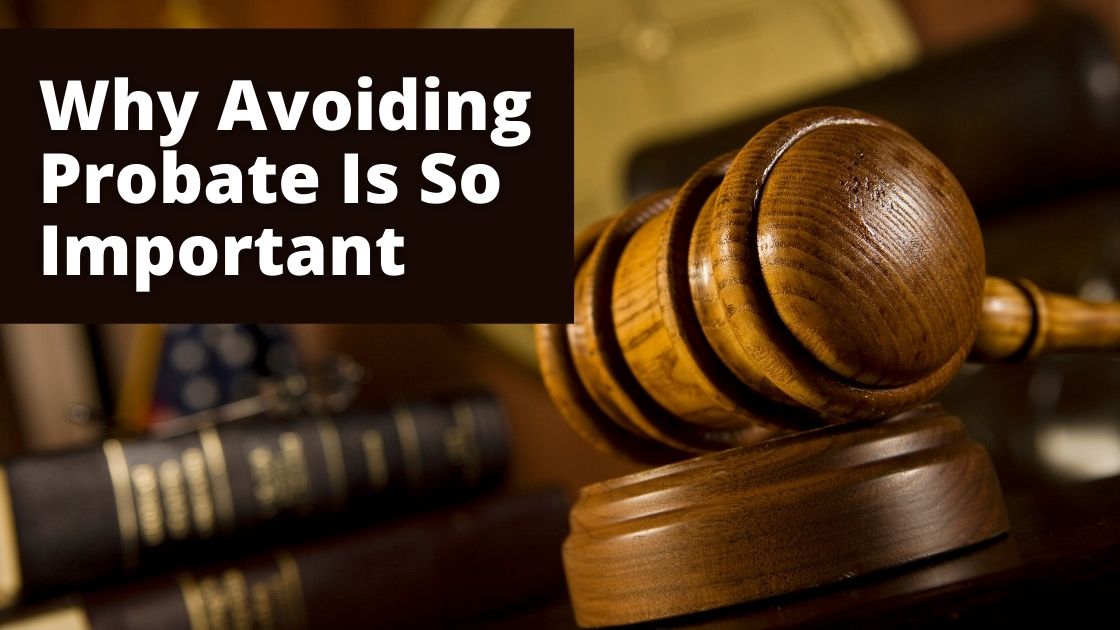Probate is that unenviable chore we all dread doing and tend to put off, sometimes until it is too late. If you haven’t yet set up a simple estate plan, there is no better time than the present. A will is important for ensuring your property is distributed according to your wishes.
Probate is the process of court supervision for the distribution of a deceased person’s estate. What you may not realize is that a will does not avoid probate.
Wills must go through the probate system. During probate, a personal representative is appointed to manage the requirements of distributing the decedent’s assets. Avoiding probate is possible with proper planning.
Why You Want to Avoid Probate
When you have a will, probate is often a straightforward process. However, there are some probate issues that may crop up.
One of the main problems is how slow the process is. The process depends on the complexity of the estate or if anyone contests the will, and it may take several years to close the estate. In many cases, if all of the heirs assent to the process, you can take advantage of what is known as informal probate.
Many do not think about the cost of probate. Costs paid by the estate usually include the executor’s fee, appraiser’s fees, administrative expenses and attorney’s fees. With proper estate and financial planning, many of these costs can be eliminated or reduced. This leaves more funds for distribution to your heirs.
Additionally there is no privacy in the probate process. Anything that goes through the probate court is a matter of public record. Anyone who desires information regarding your estate will be able to obtain it. The value of your assets being probated will also be a matter of public record.
Steps to Avoid Probate
Although probate seems like an inevitable step your family must endure following your death, there are ways to help them avoid it.
Distribute Your Assets Prior to Your Death
To ensure your estate qualifies as simplified or probate exempt you can reduce its value prior to your death. Instead of holding on to assets for your family to distribute after your death, give away items of value now. This can eliminate or reduce probate and reduce or eliminate state and federal estate taxes. As of 2021 an individual can give away $15,000 per year to another individual tax free. When adding in your spouse, you can collectively give away $30,000 to any other individual.
An estate tax is a tax that is paid against a person’s assets following their death. Federal estate taxes in 2021 are on assets over $11.7 million at rates between 18% to 40%. Some states also impose a state estate tax when an estate has assets over $1 million.
Make Accounts Payable Upon Death
By setting up your bank accounts and other financial accounts to be payable on death to a designated beneficiary, they do not pass through probate.
You may avoid probate by sharing ownership with your spouse or another person you desire to inherit your property. By having property titled in joint tenancy with rights of survivorship, community property with right of survivorship, or tenancy in the entirety, the property goes to the other owner and avoids probate. However, you always want to check to see if there are any tax implications before changing the title to your assets.
Set Up a Living Trust
When your estate plan includes a living trust, any property in that trust avoids probate. A trustee is appointed who will control the trust property and has an obligation to distribute it in accordance with the terms of the trust when you pass away.
To create a living trust in New Hampshire, you sign the trust document in front of a notary public. The trust is not in effect until you actually transfer ownership of assets to its name.
A trustee of your estate must follow the New Hampshire Uniform Trust Code. The code lists all duties of the trustee, including their duty to inform and report to all qualified beneficiaries about the administration of the trust. The code also provides steps for distributions and termination of the trust.
State Law
Each state establishes an exemption level for the size of estates that must go through probate. Property that does not go through probate includes:
- Any property the decedent holds in a trust
- Life insurance paid directly to a beneficiary
- Bank accounts or retirement accounts listing a beneficiary
- Property held in joint ownership with another person
The law requires specific estates to go through probate if any of the following is necessary:
- Validation of the decedent’s will
- Payments to make to decedent’s creditors
- Obtain decedent’s medical records
- File tax returns and pay taxes on behalf of the decedent
- Change ownership of any of the following not held in joint ownership: bank accounts, stocks, bonds, real estate, personal property
One of the best ways to avoid probate or reduce the time and cost of probate is to make sure you speak with an attorney and have an estate plan in place. Your estate attorney will provide you with the appropriate strategies to make sure the process flows as smoothly as possible following your death. This includes estate planning to minimize your tax burden, wealth management, asset protection, and guidance on funding your trust.
Deadline to Probate Estate
New Hampshire is one of the 38 states in the U.S. that does not levy an estate tax. However, if you inherit from someone who lived in or owned property in a state that does have an estate tax, such as Maryland or Kentucky, then you may have to deal with that tax. Additionally, you may not get out of taxes altogether just because you inherited an estate in New Hampshire.
The federal estate tax is applied if an inherited estate is more than $12.06 million in 2022. While it’s taxed only on the overage and not the entire estate, the rate can be as high as 40%.
When an estate has no real property and minimal assets, it is possible to file for voluntary administration. You need to file a Voluntary Administration Statement, a certified copy of the death certificate, and the original will. Some matters also require the filing of an Affidavit of Domicile or Cause of Death Affidavit.
Hiring an attorney for the handling of probate and estate administration ensures all necessary legal procedures to distribute a person’s assets meet legal requirements.
Powers of Attorney: Another Estate Planning Necessity
When you are setting up your estate plan, your attorney will likely establish a written power of attorney. A power of attorney provides legal proof of your authorization for another person to make legal and business decisions on your behalf. The written power of attorney will designate to what extent and under what circumstances the person you designate has the authority to make decisions on your behalf.
This document is critical as without it a court would have to appoint a guardian or conservator if you were unable to make decisions for yourself. This process is both time consuming and costly.
Two types of POAs you need to consider when planning your estate include the following:
A Springing POA that goes into effect only when a specific event happens, such as you become incapacitated and unable to make decisions on your own.
A Durable POA that is effective immediately upon its execution.
Another document to consider is a Health Care Proxy which provides authorization for someone to make medical decisions on your behalf. Your attorney will explain the benefits of each POA and recommend what is best for your situation.
Be aware, a will is not a POA or a health care proxy and will not provide your loved ones the ability to manage your finances or make medical decisions if you are unable to do so.
Seek Legal Advice
When you are emotional following a loved one’s death, it is difficult to manage the legal requirements of estate administration. Seek the advice of an attorney familiar with probate and estate administration now. They know how to avoid probate if possible or probate the estate if necessary.
At Borofsky, Amodeo-Vickery & Bandazian, P.A. we will provide guidance to the personal representative and assist in administering the estate. We will file all necessary paperwork with the probate court, handle the inventory of the decedent’s assets, manage notices to heirs and from creditors and provide advice regarding the payment of debts. We can assist in the transfer of title of the decedent’s property, work with an accountant of tax issues, and more.
Call us at (603) 625-6441 or send us an email to schedule a consultation.
Request A Consultation


